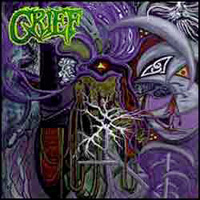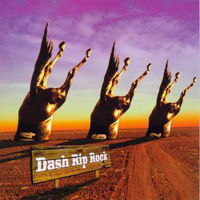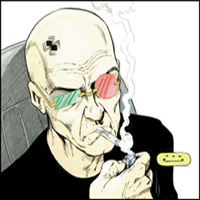 Darick Robertson
Darick Robertson
An Interview with Darick Robertson
by Jaime Kiffel
What goes on in the mind of a madman? A man who imagines, draws and stares at – for a living – a festering city of trained attack cancers, strippers with bar codes for nipples, humans who trade their bodies for atomic fog, cryogenically frozen heads, and advertising bombs that explode in dreams? And at the center of the hyper-wired City – the future’s coast-to-coast, sprawling amalgam of all cities nationwide – the madman gives life to Spider Jerusalem: A hairless, tattooed renegade journalist whose two-headed cat smokes unfiltered Russian cigarettes, who wears photo-recording glasses he had made for him by a “maker” (a machine so smart that it built its own drugs), and who chases down dirty politicians armed with a team of sex-hungry “filthy assistants,” a direct line to the press, and a bowel disrupter?
Darick Robertson, co-creator of DC/Vertigo Comics’ shockingly literary, status quo-busting hit comic Transmetropolitan, reveals that he does it all in the name of truth, justice… and fighting something even more threatening than super-villains: Censorship.
I was never a comic book reader, and yet I stumbled into Transmetropolitan (subtext: I am now addicted). Does that make me a comic geek?
Only in America, the birthplace of the comic book, do we stigmatize people for enjoying them. You don’t stigmatize someone who watches movies, you don’t stigmatize someone who watches television. If somebody is reading a magazine, that’s words and pictures, but you don’t stigmatize them for reading Time. You don’t go, “Oh, you’re a Magazine Person. You’re a Magazine Geek.” It’s really disheartening because a comic book can be anything. If you’ve ever read Maus, for example, it tells the story of Art Spiegelman’s father’s experience in the Warsaw ghetto, but in this simplistic style, so it’s easier to swallow. The comic book has limitless potential, and yet seems to have a self-imposed ceiling.
I know that censorship is an issue for you. What would you have liked to have done with Transmetropolitan that you couldn’t?
The c-word’s a no-no, although in England, it’s not quite as harsh as it is here. They throw that word around like we do “motherfucker.” Nobody’s offended by “motherfucker” anymore. But women are very sensitive to the c-word.
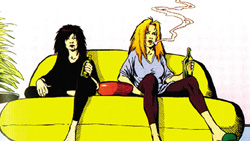 Does everything you want to use – censored or not – further the plot in some way?
Does everything you want to use – censored or not – further the plot in some way?
Yes, it does contribute to the story as atmosphere. One of the most inconvenient occasions of censorship involved a shot of Spider urinating out of a window. It was a distant shot so he was really, really tiny in the frame, and you could see a little arc of urine coming out and down, and that was the whole point: He was urinating on the city. Well, [DC] didn’t like that. They said you can’t show public urination. I can draw heads exploding in graphic detail, but I can’t draw public urination. So I had to redraw the entire page. You couldn’t even see his penis because it was too far away, but that was still a no-no.
Also, in the issue that was all splash pages, there was a drawing of a picture of a girl crying and lifting her dress to show bruises all over her thighs, and another drawing of an older man in a swimsuit with his arm around a very young boy also in a swimsuit, looking uncomfortable.
The powers that be made us crop the picture (after I had drawn it, of course – God forbid they read the script first) so you couldn’t see the girl’s lower body, or the bruises, which were the point, and they made me alter the boy’s expression. The whole point of the page was to speak out against this abuse (in the story, Spider exposed a man-child dating service) by showing how awful it is, and instead, they watered it down so all impact was taken out of it.
In another instance, they made us rework what has to’ve been my favorite cover, because they were afraid the Charlie’s Angels people would sue. Pretty chickenshit, if you ask me. I still contend that you can’t copyright using a silhouette. Ironically, they changed the background to a 3-eyed smiley. I wish they’d been as concerned over the film Evolution‘s usage of the 3-eyed smiley, after we’d put it on over four years worth of merchandise and associated ourselves with the smiley from the very beginning of the book, all the way back to the pre-release promotional material.
I noticed that some of the fashions in Transmetropolitan – though they’re supposed to be far in the future – still hide certain parts of the body, and I wondered if that was a conscious or censored choice.
That’s the thing that really makes me mad, because we own the book. We own the character. And it’s supposed to be aimed at adults. But when the action figure came out, he couldn’t have a cigarette. There are all these little lines you can’t step over and give the artist and writer artistic freedom to do the story they want to do. I mean, this is solid stuff… It’s not like we’re doing gratuitous sex and violence. There’s a reason for it, there’s a context for it when it appears.
So the part when Spider and [his assistant] Yelena have sex and we only see it from the perspective of [Spider’s other assistant] Channon’s reaction – was that censored?
Actually, that wasn’t anything we were held back on. I think it was funnier to focus on Channon’s expression, the angle of her head and such. That was the way Warren asked for it. He was more for the comedy aspect of it.
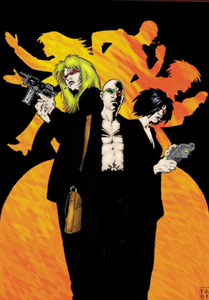 So they got the censorship they needed when it was actually appropriate.
So they got the censorship they needed when it was actually appropriate.
(Laughing) It’s true. I always felt really angry, too, because I felt like Preacher, Garth Ennis’ book, was allowed to do more than we were. How come they can do it and we can’t? I always felt like we were the underdogs, the middle child.
So where will your career take you next?
I’ve been working a lot for Marvel lately because Marvel just launched a line of mature reader comics, and they’re being a lot bolder, really going for broke. I think it’s quality stuff.
I think if comic books are going to survive, they’re going to have to start realizing that their audience has grown up, too. Even the kids aren’t kids anymore, you know? What they get in a video game is far more graphic than any comic book. And there are still comic books made for children. That’s the idea. There’s a wide variety of what a comic book can do and who it can appeal to.
I think most people now think comic books are the way they were in the late ’70s and early ’80s. They kind of have a post-dated memory of the way it was. But that’s like seeing television the way it was in the late ’70s and early ’80s. There’s great television now. You never would’ve had anything like The Sopranos in 1982. So why would you think that everything else wouldn’t keep up?
One thing I love about Transmetropolitan is the advertising posted throughout The City.
That’s where I tend to have my fun. If I bring anything to the book on my own, it’s what goes on in the background. Sometimes Warren asks for certain things, but most of the time, it’s me going wild.
You must be a big fan of advertising.
I like it… in a weird way. It’s hard to say I’m a fan of it, I almost find it ridiculous, but I almost feel like I’d be really good at it. If I weren’t drawing comic books, in a parallel reality, I’m making a lot of money doing that. I also think that more than anything, advertising mirrors what’s going on in a culture. For instance, the Robitussin cough syrup ads: It’s really okay in our society now that if you want to sell cough syrup, you can show men as complete infants. It reinforces the stereotype that women have to hold the domestic role. It’s saying that if a man’s wife gets sick, he’s left rolling on the floor with the children in the house; if he irons his own shirt, there’s a big iron mark on the back. And mom’s like, “Oh God, I can’t even be sick for 24 hours!” Good Lord! It’s like men are just huge man-toddlers. How insulting. That would never be okay if the roles were reversed.
Speaking of advertising, I like when Spider dresses as Jesus, bashes a religious convention, and basically overturns the moneylenders’ tables…
That first year (of the series) was my favorite. I almost wish that… I mean, where Warren went with it was interesting, and it’s been a great story, but I wish there were more of Spider wandering around like a madman and just destroying everything, exposing everything. The book’s gotten really bleak in the last year.
If you were in The City, where would you go?
If I were in Spider’s world? I’d definitely go buy me a maker, that’s for sure. I think just being in The City, period, would be enough of a sensory overload, where everywhere you turn there’d be something interesting. I’d probably go to some total immersion place where I could spend an afternoon on another planet.
That world really scares me, though. I don’t know if I’d be that comfortable in Spider’s reality. That’s why I enjoy drawing it. When I was a kid, I was terrified of sharks, so I had to know everything about them. I draw everything that disturbs me about the city.
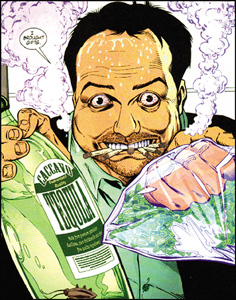 Anything specific?
Anything specific?
The rampant poverty that’s tolerated. Every time I see somebody who’s got an entire house built in a doorway, I can’t imagine that existence. It terrifies me and breaks my heart at the same time. I go through a myriad of emotions whenever I see these people who exist in the city but aren’t actually a part of it.
How did you meet Warren?
Warren and I met while working on other comic books that weren’t our own. When I read one of his scripts, I recognized immediately what a talent he was, and didn’t hesitate to call and tell him so. He said if I ever want to do a monthly book, he’d be all over it.
We did one other book together that was mostly conversation and science-fiction based called Man of the Atom, a double-sized book. Later, he called, wanting to know if I wanted to do Transmetropolitan. And I’d just been offered a Spider-Man teamup with Marvel, and it was like “Ugh, jeez, I’ve finally been offered a monthly script, which do I do?” I decided I’d much rather create something. And I thought for sure this thing was going to get canceled after four issues. I mean, that’s the way the market was at the time. But I said well, I’d rather do four issues and have a good time, and roll the dice than I would just drawing Spider-Man again. At the time, Spider-Man wasn’t as much fun as it is at the moment. Marvel’s a much better company now than it was five years ago. So it was a choice between owning a character and following a character. It’s nice because with Spider Jerusalem, I’m the only guy who’s ever drawn him on a regular basis, I’m the guy known for him. So my name and Warren’s name will always precede his character, whereas when you’re drawing something like Spider-Man or Batman, your name follows.
Are you and Warren a strong team as friends?
Yeah, I think Warren’s my friend. I mean, he lives in England, we have separate lives, so I don’t talk to him on the phone every day…
What I mean is, do you experience mind-meld?
When it comes to an artistic synergy, we’re a good team. I mean, I’ve brought my own things to the party, it’s basically been his story, but I’ve definitely been involved. I think it’s like a mommy-daddy situation. What the father gives to the child is different from what the mother gives, but both are essential. At the same time, with Transmetropolitan, it’s like we both grew a cherry tree: You can’t point to which cherry I’m responsible for, and which one he is.
So it’s not like you’re calling each other in the middle of the night with sudden brainstorms…
In the beginning, it was a little more like that; after a couple of years, we just kind of got the rhythm. He writes, I draw. I interject my ideas here and there. I take liberties with the backgrounds. What he doesn’t write is what I do.
Are there any moments that stand out as you both thought, “Oh, that has to happen”?
Plotwise, no, I think it’s always been out of Warren’s head. I’m in a reactive mode to what he plots. But I created the cat. I created Spider’s glasses, and the fact that they take pictures. I put The Sex Puppets into the background. But Warren turned around and wrote it into the story more often. He started asking for it. You know, like, they’re watching this on television, or The Sex Puppets is somebody’s favorite show. We feed off each other’s creativity.
I read that you work with music or movies running. How does that work with your wife’s schedule?
My wife is really adaptable. I work through the night on a regular basis. I tend to be an insomniac. I kinda need that isolation in the middle of night to do a large body of work in a short time. She’s a pretty heavy sleeper. I’m more worried about how it’s gonna affect my son.
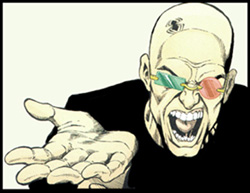 What spurs you? Any specific music?
What spurs you? Any specific music?
I really would love to be able to say, “Oh, I’m listening to some really edgy, crazy…” but it’s really just a concentration/relaxation thing. So I find myself gravitating to stuff I grew up on, so lately, it’s been old hokey ’70s radio crap. Like Bee-Gees and obscure one-hit wonders. I have a real affection for that music because in the middle of the night when I’m drawing my pictures, it takes me back to a more kind of primitive state of mind when I was more creative. It’s like Picasso said – not that I’m comparing myself – but he was at his best when he was four years old. It’s about getting back to the primitive state of mind.
I read that you write, too.
I’m trying to push myself to write more. My dream is to be a complete creator that people would seek out, like Frank Miller. I’ve been heavily edited in the past, so I want to be able to cut loose. I’m hoping that after Transmetropolitan, I’ll get to do more writing and drawing. I’m now inking my own work, and I’m much more satisfied with that. The difference in my enthusiasm is tremendous. It’s really – with all due respect – ultimately, [inkers are] translating what I’ve already done. If it’s not the way I want it, it’s very depressing. Sometimes they bring something to it that I can’t. But ultimately, I want to put out what I want it to look like. It’s like translating my jokes into Spanish: I might be the funniest guy in the world, but all you get is the Spanish translation.
I also read that you play guitar.
I play piano and guitar, and I sing. I was briefly in a band, did a lot of open mics, just for fun. I never took it very seriously. Comics are good enough; it’s time-consuming. After a certain age, being in a band seems silly. I’m 33. I think if I had started earlier…
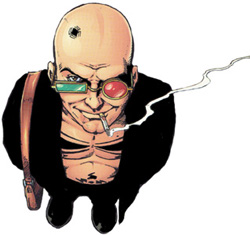 Thirty-three? That’s not old!
Thirty-three? That’s not old!
Well, thank you – I think that’s the best compliment I’ve gotten all day. Actually, I was playing more actively when I did art all the time. No pressure was on being excessively good or competitive with it.
What style do you play?
I don’t know; I guess mostly acoustic stuff. (his tone implies that he’s embarrassed because it’s not heavy metal)
I’m a folk fan.
(Relieved) Oh, you’d love my stuff then. Elvis Costello and Tom Petty are my biggest influences.
I read that your friends sometimes appear as the models for characters in Transmetropolitan. For instance, your friend André Ricciardi was the model for Spider…
André is still a close friend. When it came time to do Spider, he was so much like Spider in his own right… Spider ended up being older and kind of growing into his own character by himself, but André is definitely the basis for it. His wife, actually, is Channon. He doesn’t really look like Spider as a fashion guy. He isn’t bald. He’s more like Spider with the long hair and the beard, in the beginning of the series, though not quite as extreme. We wanted to shave him down and take him to a comics convention or two, but it never really worked out. He’s not really into comics.
I noticed that Spider never kisses his cat. It seems there are certain elements of softness that he just won’t show. But there is a moment when he kisses a woman on the forehead…
That’s probably my favorite issue. We never see him being tender, right? I love the whole thing. I think that’s when the potential of the series became obvious.
What literature has influenced you?
I’m a big Irvine Welsh fan. I really want to take The Acid House and turn it into a comic book. The stories are so visual. I also want to do Huxley’s Brave New World as a comic book series, but very stylized.
What do you believe the comic format can bring to literature?
Books are visual anyway. In comic book form, you can enjoy the art on two levels at once. For me, because I translate scripts into pictures, I have a hard time not doing that automatically. Sometimes, I’m really enjoying what I’m seeing in my brain, and I want to share that. Especially if you do it the way [Huxley] was imagining: That book actually was more prophetic than 1984. At the same time, there was naiveté that would be great to remind readers of. In 1930, Huxley predicted television, but it was more a moving decoration than an interactive thing. It was more of a novelty.
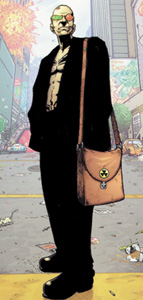 And in Transmetropolitan…
And in Transmetropolitan…
It’s all over the place. Actually, I really think that television in general is becoming more like Spider’s world. You can’t just watch one thing at once. Little things pop up and tell you to log on to this or look for this other show and I think that’s what’s going to become completely interactive television, and I don’t think it’s necessarily a good thing. I think in some ways, people are going to want to be left alone while they’re trying to enjoy something.
Totally different topic: Did you go to college?
No I didn’t, actually. I would have liked to, my parents didn’t have any money, and I wasn’t a very good student. Ironically, it’s because I was drawing all the time. I didn’t know anything about scholarships, I had no clue that you could go to college without having parents with money. I went to school in a more wealthy neighborhood than my own, and everyone there were sons and daughters of doctors and lawyers and it seemed like they were given anything. My dad was an airplane mechanic, my mom was a housewife, and neither one of them were college-educated. My dad had a couple years of college, but nothing serious. So I didn’t really have that option.
I’m mostly self-taught in art. At the same time, I have a real thirst for good self-education. I read a lot, I watch a lot of educational television. And I listen to people. Not that I would discount anybody’s college education, but it kinda just tells you: Go there and read this, and we’ll prove you did by giving you a piece of paper at the end of it. There’s nothing stopping a person from going to a library on their own.
You’ve talked about violence, it’s in everything. You seem very soft-spoken, and a nice person, but usually, people like that come out with this id form in their art. Is that true for you?
It’s definitely an outlet. I enjoy drawing it and I always have. In my teenage years, I used drawing to work out a lot of aggression. I draw comic books for a living, so you can imagine I wasn’t Mr. Popularity. I still work out a lot of aggression with my art. It’s different when you’re drawing it, it slows you down, you think about it. For me, it creates much less of a desire to act out because I’m spending an hour with a very violent image and thinking about it in graphic detail. That diffuses away any desire to actually do anything violent. I think we, as a species, have a need for violence. We have a lot of old signals that come from the reptile part of our brain that say kill and hunt and mate, and we’re trying to translate them into the human experience of 2002.
I like that after Spider is attacked and he has to retaliate, he throws up.
I thought that was really great, too. That’s Warren being a good writer. You get the feeling it’s something Spider really doesn’t want to do. I just wish the only violence in the world were just in television and comic books. But you know what? You watch the news. You watch Cops, that’s pretty violent. It’s out there, we don’t own it, we don’t propagate it. And if you use it as a story element, that’s just part of real life. I don’t necessarily advocate it, but I also don’t want to pretend it’s not there.
(www.transmetropolitan.com)

